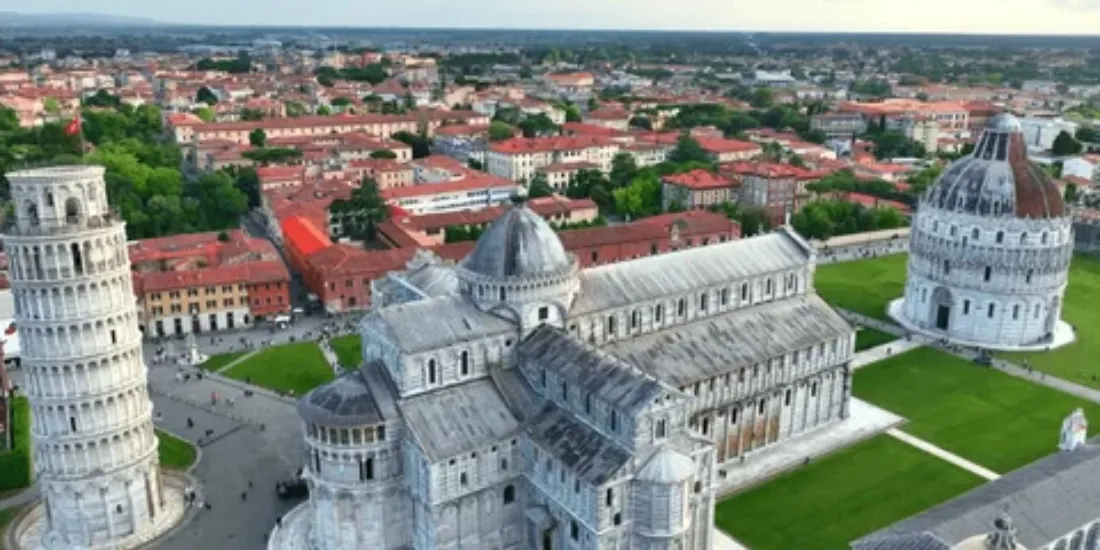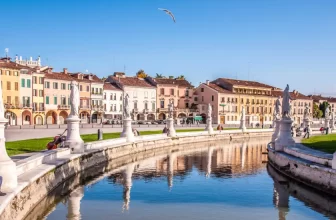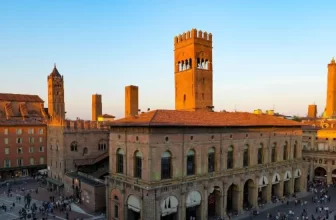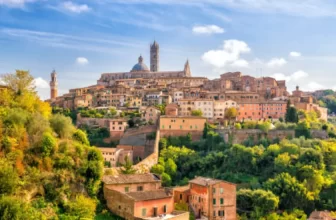
The first thing that hits you when you step out of Pisa Centrale isn’t the famous tower-it’s how warm the light feels. The streets are lined with pale yellow buildings, small balconies overflowing with potted plants (and laundry), and this laid-back buzz in the air. You’ve just arrived in a real piece of Italy-and somehow it’s not overwhelming.
I remember dragging my suitcase across old cobblestones, trying not to break the wheels, while a group of students with backpacks and espresso cups hurried past me like they knew something I didn’t. The smell of fresh pastries wafted from a tiny hole-in-the-wall near the station-cornetto+coffee for €2.50, by the way. Welcome to one of the most affordable student cities in Italy.
By the time I reached my Airbnb, I already knew three things: Pisa is walkable, full of students, and both quieter and cooler than I’d assumed. It had real character. Not showy. Not chaotic. Just right.
If you’re looking for an honest, no-fluff study guide in Pisa that covers everything from universities to student visa tips, cost of living, accommodation, and what being a student here actually feels like, this is for you.
Why Study in Pisa in 2026?
Yes, people come here for the Leaning Tower, but students stay for affordable education, a friendly atmosphere, and programs that actually make sense for life after graduation.
Key Reasons 2026 Just Makes Sense:
- Italy is stepping up its international recruitment-offering over 500+ English-taught degree programs
- Pisa is world-famous for STEM, aerospace, and computer science (think NASA-level talent)
- Study visa policies in 2026 still allow you to stay 1 year after graduation to find work
- Budget-friendly: tuition starts at €2,500 per year, and your monthly budget doesn’t have to exceed €900
Let’s break that down:
- University of Pisa has over 50,000 students
- International population grows every year-with current student demographics from India, Iran, Brazil, Turkey, Nigeria, China, and Germany
- Located in Tuscany, insanely well-connected-Florence is under an hour, Rome in two
Plus, admission is open to a wide range of international students, thanks to Italy’s flexible entry rules for non-EU applicants (especially in Engineering and Pharmacy).
Why Pisa Is a Hidden Gem for International Students
The Academic Scene
This isn’t just a city with one famous building. Pisa is one of Europe’s oldest university towns, and it lives and breathes that legacy.
You’re surrounded by libraries, students constantly running between old seminar halls, and street cafes packed with notebooks, noisy espresso machines, and intense group debates. Welcome to campus life and culture, Italian-style.
International Support
- Student Services Office (DSU) helps with accommodation, dining halls, integration programs, and cultural access
- There’s an International Tutor Scheme to help you adjust to Italian bureaucracy
- Lots of programs to help you learn Italian while you study
The vibe? Welcoming. You’ll hear multiple languages daily, and trust me-no one expects you to speak perfect Italian from day one. (Although saying “Mi scusi, dov’è la mensa?” will get you far.)
Career Connections After Graduation
Pisa has solid post-graduation employment networks, especially in:
- Tech (with links to nearby Florence + Rome)
- Aerospace (hello, Italy’s Galileo Satellite Network)
- Research and Physics (thanks to the Sant’Anna School of Advanced Studies)
- Health and public administration
Plus, since it’s a UNESCO research hub, you’re well-placed if you’re into fieldwork, academia, and innovation pathways throughout Europe.
Universities in Pisa: Where You’ll (Actually) Be Studying
Pisa’s universities might be fewer in number, but they’re heavyweights-especially for international students seeking high-quality, low-cost degree programs in Europe.
University of Pisa (Università di Pisa)
- One of Europe’s most elite public schools-established in 1343
- Global ranking: Top 200–250 worldwide
- Tuition for international students: €2,400 – €3,500/year
- Notable programs:
- Computer Science (English-taught BSc)
- Data Science (MSc)
- Management for Business and Economics
- Medicine & Surgery (limited seats, exam required)
- Aerospace Engineering
Student vibe? Academic-focused, respected, and deeply embedded into the city. Study halls in ancient cloisters, professors who’ve worked on EU space programs, and students that actually care about lectures.
Scuola Normale Superiore
- Major research institution with crazy high standards
- Ideal for pure sciences, philosophy, mathematics, and research postgrads
- Admission is extremely competitive-but mostly free if accepted
Sant’Anna School of Advanced Studies
- Specialized in biotech, law, innovation policy, and economics
- Strong international collabs with France, Germany & the US
- Again, free or nearly free tuition for those who qualify
Higher Institute for Artistic Industries (ISIA Firenze – Pisa Campus)
- Great if you’re eyeing a creative design future that’s integrated with applied tech
- Fashion technology, communication design, and interaction development
Best Student Accommodation in Pisa
Housing in Pisa isn’t the nightmare that is Milan-but start early.
University-managed dorms via DSU Toscana
- Cost: €180–€280/month
- Shared rooms available (private rooms limited)
- Comes with: Wi-Fi, utilities, basic furniture, and a shared kitchen
- Application via DSU regional portal-apply by June 2026
Private Apartments or Shared Flats
- Via Erasmus Play, Uniplaces, or Idealista.it
- Typical student rent: €300–€450/month (shared), €550–€700 for studios
- Area: Look in San Francesco, Porta a Lucca, or Cisanello
Homestays (Less common, but exist)
- Around €400 with food, helpful for beginners or language immersion
- Great if you’re here short-term or have strict dietary/language needs
✅ Pro tip: ALWAYS check heating availability-it gets cold in winter, and old apartments don’t always cope well.
Best Neighborhoods to Live As a Student in Pisa
San Francesco
- Quiet, central, walkable
- Near faculties for Law, Literature, Political Science
- Cafes with actual student discounts
San Martino
- Close to nightlife and riverside bars
- Slightly louder, rent a bit cheaper
- 10–15 min walk from most faculties
Porta a Lucca
- Residential and chill, close to Engineering campus
- Perfect for postgrads, med students, focused undergrads
- Good bus links + bikeable
Cisanello
- Newer flats, close to hospitals for Nursing/Med
- Further from city centre, but more space and private housing available
Cost of Living in Pisa – Let’s Talk Budget
| Category | Low budget (€) | Mid budget (€) | High (€) |
| Rent | 280–320 | 450–550 | 650+ |
| Groceries | 120 | 150 | 200 |
| Transport | 27 (student pass) | 27 | 50 |
| Phone/Internet | 20–30 | 40 | 60 |
| Entertainment | 50–100 | 120+ | 200+ |
| Healthcare/Insurance | 150/year (SSN) | Same | Same |
| Monthly Total | €600 – €1,000 | Depends if you eat pasta daily or not |
✅ Money-Saving Hacks:
- Eat at mensa universitaria (university canteen) – meals literally €4
- Use Bike Sharing Pisa or walk everywhere
- Buy a Toscana regional student train pass if planning to explore Florence, Lucca, Cinque Terre
Scholarships for International Students in Pisa
Don’t skip this. Italy is so underrated for scholarships.
DSU Toscana Scholarship
- Covers: tuition, housing, meals, monthly allowance
- Based on family income (~€23,000 ISEE threshold for full coverage)
- Apply by July 2026
UniPi International Awards
- Varies per department
- Often merit-based: GPA + motivation letter
- Covers partial tuition fees or provides research funds
MAECI & Invest Your Talent in Italy
- Full or partial funding for MA students from selected countries
- Deadlines: Usually Spring/Summer
How to Apply (And Not Stress About It)
Step-by-Step
- Research programs (Nov 2025 – Jan 2026)
Check UniPi or Sant’Anna official sites for programs + deadlines. - Prepare Documents
Transcripts, CV, passport, motivation letter, English/Italian test proof - Apply Online (Feb–May 2026)
Through Apply Unipi platform or national portal - Submit scholarship applications (Jun–Jul)
Look up DSU, MAECI, Invest Your Talent, and Erasmus+ - Apply for visa (Jul–Aug)
Prepare ahead. Book embassy appointments early. They fill up fast.
Visa and Working Rules in 2026
- Visa = Long-term student type D visa
- Need: acceptance letter, financial proof, housing, insurance
- Work limit: 20 hours/week part-time
- Apply for Codice Fiscale + Permesso di Soggiorno in first 8 days after arrival
Public Transport in Pisa
- Small city = mostly walkable
- Student bus pass: €27/month/month
- App to download: Moovit, AT Bus Pisa, Trenitalia
Student Life, Food, and Weekend Vibes
Day starts with espresso, ends with gelato. Classes in the middle.
- Study at Biblioteca Universitaria di Pisa or Palazzo della Sapienza
- Dinner with roommates = pasta plus a lot of loud opinions
- Thursday nights? Head to Argini e Margini or bars on Lungarno
Internship and Career Opportunities
- Lots of research-based internships in Sciences and Tech
- B-school tie-ups with Florence and Milan startups
- Language teaching jobs via private centers or peer tutoring
Platforms to use: Euraxess, JobItalia, AlmaLaurea, LinkedIn Italia
Application Timeline for 2026
| Month | Task |
| Nov 2025 | Research & shortlist programs |
| Jan–Feb 2026 | Application deadlines start |
| Mar–May | Offers roll out |
| Jun–Jul | DSU scholarship deadlines + housing |
| Jul–Aug | Visa application + flight booking |
| Sept 2026 | Land in Pisa for orientation |
Public vs Private Unis in Pisa at a Glance
| Factor | Public (UniPi, Sant’Anna) | Private (BBS etc.) |
| Tuition Fees | €2,000–€3,500 | €10,000+ |
| Living Costs | Low | Low–Medium |
| Research Output | Very Strong | Moderate |
| Language | More English options now | Mostly English |
| Scholarships? | Yes, lots | Fewer |
Final Thoughts: Is Pisa Right for You?
If you’re someone who:
- Hates massive city stress
- Wants real student life, in an authentic European town
- Likes budget-friendly pasta
- Wants top-level academics without going deep into debt
Then… yes. Pisa is a good call.
You’ll get culture, sunshine, espresso, huge academic legacy, and a blueprint for living that actually feels balanced.
FAQs: Final Things Students Always Ask
No. Budget ~€700–€900/month and you’re solid (including rent).
Yes. 20 hrs/week legally. Get your Codice Fiscale + student permit ASAP.
Yes. Small, walkable, secure. Just avoid the train station area late at night.
Yes. You can extend your stay by applying for the “Permesso per attesa occupazione” work-seeking visa.
Start by May–June. Dorms are limited. Private housing gets competitive early.
Unicredit, BNL, and Poste Italiane are easy to set up accounts with.






